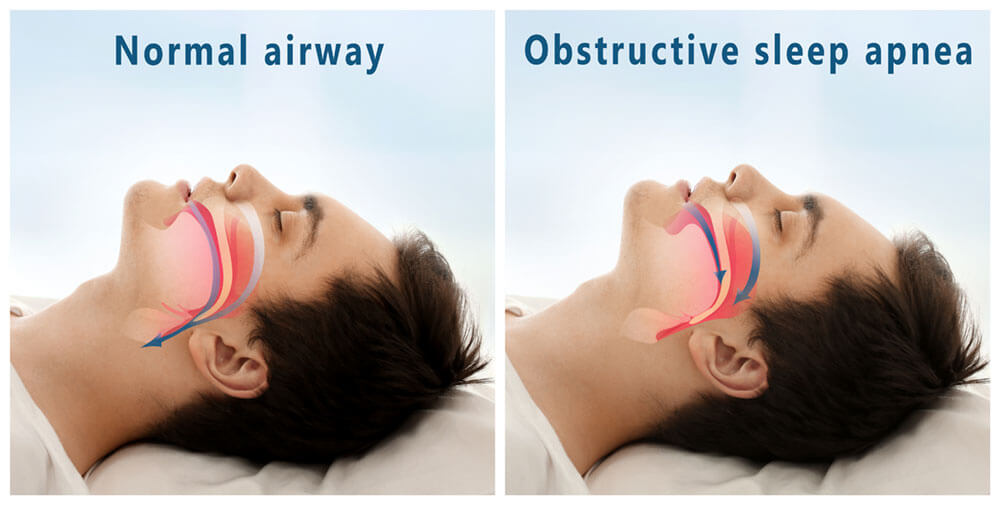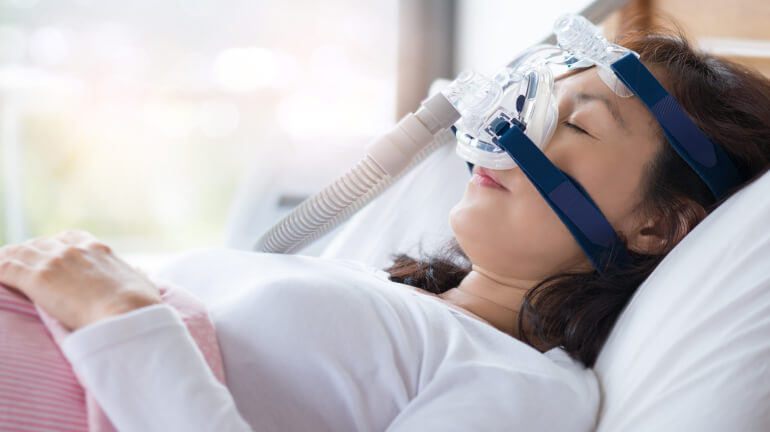Sleep Better, Live Healthier with Sleep Apnea Treatment in Waterford, MI
Quality sleep is essential for overall health, but many people struggle with conditions that interrupt their rest without realizing it. One of the most common and often undiagnosed sleep disorders is sleep apnea. Left untreated, it can lead to serious health problems and affect your daily quality of life. At Oakland Family Dental, our sleep specialist in Waterford, MI, Dr. Amanda Sheehan, specializes in helping patients identify and treat sleep apnea.
Whether you live in Waterford, Clarkston, Pontiac, White Lake, or nearby communities, our team is here to provide compassionate, effective care to help you breathe easier and sleep better. If you’re ready for peaceful nights, contact our Waterford dental office by calling (248) 674-0384.
Sleep Soundly with the Help of Dr. Sheehan
Dr. Amanda Sheehan is a diplomate of the American Academy of Dental Sleep Medicine, a distinction that highlights her advanced training and expertise in treating sleep-related breathing disorders. As an experienced Waterford dentist, Dr. Sheehan offers effective, patient-focused solutions for sleep apnea, including custom oral appliances and comprehensive treatment plans.
Patients benefit from her compassionate approach, which considers comfort, lifestyle, and health goals. Whether you are struggling with snoring, daytime fatigue, or more severe sleep apnea, Dr. Sheehan can help you breathe easier and sleep more soundly.
What is Sleep Apnea?
Sleep apnea is a disorder where breathing repeatedly stops and starts during sleep, preventing the body from getting enough oxygen. These pauses in breathing can last anywhere from a few seconds to over a minute and may occur multiple times throughout the night. As a result, people with sleep apnea rarely reach deep, restorative sleep, leading to daytime fatigue, morning headaches, irritability, and even more serious conditions such as high blood pressure, heart disease, and diabetes.
Types of Sleep Apnea
Sleep apnea is not a one-size-fits-all condition. Understanding the type you have is essential for effective treatment.
Obstructive Sleep Apnea (OSA)
OSA is the most common form and occurs when soft tissue in the mouth and throat collapses during sleep, blocking the airway. This often leads to loud snoring, frequent awakenings, and daytime sleepiness.
Central Sleep Apnea (CSA)
CSA is less common and occurs when the brain fails to send the correct signals to the muscles that control breathing. Unlike OSA, CSA isn’t caused by airway obstruction, but it can still significantly disrupt sleep.
Complex or Mixed Sleep Apnea
This is a combination of both OSA and CSA. It may require a comprehensive approach, often blending lifestyle changes, oral appliances, or medical interventions.


Why Sleep Apnea Shouldn’t Be Ignored
Sleep apnea can take a serious toll on your health and daily life. Symptoms often include:
- Loud snoring
- Waking up gasping or choking
- Morning headaches
- Difficulty staying awake during the day
- Irritability, memory problems, or difficulty concentrating
Untreated sleep apnea increases the risk of high blood pressure, heart attack, stroke, and type 2 diabetes. In addition, chronic fatigue can affect your work, relationships, and overall quality of life.
Early diagnosis and treatment are critical. As a sleep apnea specialist near you, Dr. Amanda Sheehan ensures that patients in Waterford and surrounding areas receive the care they need to prevent these serious complications.
How Sleep Apnea is Diagnosed
Diagnosing sleep apnea begins with a detailed evaluation by your dentist in Waterford, MI. Key steps include:
- Medical history review: Understanding risk factors such as obesity, family history, or chronic conditions.
- Physical examination: Checking the mouth, jaw, and airway for obstructions or anatomical concerns.
- Sleep study (polysomnography): In some cases, Dr. Sheehan may refer you for an overnight sleep study to monitor your breathing and oxygen levels while you sleep.
Once the type and severity of sleep apnea are confirmed, a customized treatment plan is created to improve your sleep and overall health.
Treatment Options for Sleep Apnea
At Oakland Family Dental, we offer a variety of treatment options tailored to the needs of each patient.
Oral Appliance Therapy
Custom-made devices reposition the jaw and tongue to keep airways open during sleep. Oral appliances are comfortable, non-invasive, and highly effective for mild to moderate sleep apnea.
Continuous Positive Airway Pressure (CPAP)
CPAP machines deliver a steady flow of air through a mask to maintain an open airway. While highly effective, some patients prefer oral appliance therapy due to comfort and convenience.
Lifestyle Modifications
Simple changes can reduce sleep apnea severity, including:
- Maintaining a healthy weight
- Avoiding alcohol or sedatives before bedtime
- Sleeping on your side instead of your back
- Practicing good sleep hygiene
Surgical Interventions
For severe or structural cases, surgery may be necessary to remove excess tissue or correct anatomical issues. Dr. Sheehan collaborates with medical specialists when surgical intervention is required.
Lifestyle Tips to Complement Treatment
In addition to professional care, making small adjustments at home can improve results:
- Exercise regularly – Helps maintain a healthy weight and reduces sleep apnea severity.
- Sleep position – Sleeping on your side may reduce airway obstruction.
- Avoid alcohol and sedatives – These relax airway muscles and worsen symptoms.
- Consistent sleep schedule – Regular sleep routines improve overall sleep quality.
These changes, combined with Dr. Sheehan’s skilled care, can significantly enhance your sleep and overall health.
Frequently Asked Questions
There are several factors that can contribute to a breathing obstruction, such as obesity, genetics, and physical blockages like a small airway or enlarged tonsils. Though OSA is most often found in males and older patients, there are several factors that may increase your risk of sleep apnea, including:
- Excess weight
- Narrow airway
- Large neck circumference
- Family history of sleep apnea
- Nasal congestion
- Certain medical conditions or medications
- Smoking and alcohol use
- Body and hormonal changes during pregnancy
A sleep study, also known as a polysomnogram, describes when a patient is monitored by a certified sleep specialist to determine whether they suffer from a sleep disorder. They’re typically completed in a special overnight lab, but a sleep study can also be done in the comfort of your own home.
The cost of your treatment plan will vary depending on the methods used to treat your symptoms as well as your insurance plan. During your consultation, we’ll also take the time to discuss your treatment timeline, estimated costs, and the various financing options we offer to help cover treatment.
Unfortunately, sleep apnea is a chronic condition which means that without professional intervention, it’s highly unlikely that it will subside on its own. If you think you suffer from sleep apnea, you don’t need to panic. Dr. Sheehan will examine your symptoms and provide a proper sleep screening. If she thinks you’re at high risk for sleep apnea, we’ll arrange a sleep test performed by a board-certified sleep doctor to get an official diagnosis for your condition.
Once you’ve been diagnosed, Dr. Sheehan will meet with you to discuss your treatment options and determine the best solution for you to reclaim your sleep once again.
Improve Your Sleep and Health at Our Waterford Dental Office
Sleep apnea is more than just snoring, it’s a serious condition that can impact your health, relationships, and quality of life. As a trusted sleep apnea specialist near you, Dr. Amanda Sheehan at Oakland Family Dental, provides comprehensive, patient-focused care for all types of sleep apnea.
Don’t wait to improve your sleep. Schedule a consultation today with a leading Waterford dentist by calling (248) 674-0384 for effective sleep apnea treatment in Waterford.
